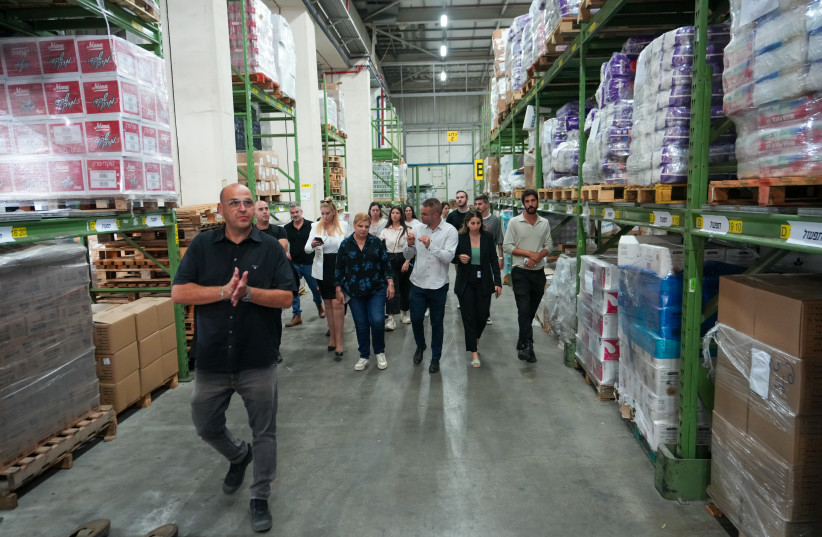In order to fulfill its vision of breaking the cycle of poverty in Israel, Pitchon-Lev not only provides daily support to families in need but also works with government ministries and members of the Knesset to pass the “Pitchon-Lev Law to Eradicate Poverty.”
Pitchon-Lev (Opening of the Heart) is an “apolitical, not-for-profit established in 1998 as a national humanitarian organization focused on breaking the inter-generational cycle of poverty in Israel” according to its website.
If approved, the law in its name would task the Israeli government with handling the issue of poverty for the first time in the history of the country. The organization routinely cooperates with the Israeli government and members of Knesset, both during peacetime and in times of emergency.
Since October 7, the day of the brutal Hamas terrorist attack on southern Israel, Pitchon-Lev has become a fundamental partner of the Israeli authorities.
In the first week of the fighting in Gaza, many emergency centers opened overnight to aid thousands of families from the Gaza border communities, many of whom suddenly found themselves destitute, as well as tens of thousands of other families from the South and the North who were immediately evacuated from their homes.
Many members of the Israeli Knesset who wished to help the war efforts and the home front found themselves in a bind since they could not legally raise donations for independent activities.
For this reason, some 88 members of the Knesset sent an official letter to its legal adviser, requesting to work with Pitchon-Lev and be authorized to raise donations on behalf of the organization. The letter marked an impressive display of unity and willingness to cooperate for the greater good across the political spectrum.

The legislators emphasized that they chose Pitchon-Lev in light of its extensive experience, infrastructure, and expertise in managing aid in emergencies. They also mentioned that they wanted it to take care of the requests for assistance that reach their desks daily.
The Knesset’s legal adviser approved the request, and for the first time in the 75 years since the State of Israel’s establishment, an aid organization has been recognized by law as the official organization working directly with members of the Knesset.
How does the process work?
Since the very beginning of the war, members of the Knesset have been receiving hundreds of requests for assistance, for which they raise donations. They forward both the requests and the donations to Pitchon-Lev, which takes care of purchasing what is needed and delivering it to families, communities in the South or the North, and IDF units.
Recently, Pitchon-Lev CEO Eli Cohen was called to participate in the Knesset’s Economic Affairs Committee session on the sharp increase in the prices of essential food products in Israel during the war. The rise in prices harms the families who already found themselves in poverty before the war and whose situation has further deteriorated since October 7.
During the debate with the members of the Knesset, Cohen also warned that after the war ends, Israel would face the reality of assisting a high number of families who lost all that they possessed. Already, as a field organization providing holistic assistance, Pitchon-Lev is required to bring solutions to hundreds of thousands of families who are facing difficulties.
At the time, MK Shelly Tal Meron (Yesh Atid) asked to speak and offered her testimony regarding Pitchon-Lev’s work.
“Pitchon-Lev is a wonderful organization,” she said. “It is impossible to find words to describe what they have done for the State of Israel in the last three weeks.”
“Trucks upon trucks of food and equipment were delivered to citizens, babies, and anyone in need. This man [Eli Cohen] really made it possible, and I have no words to thank him for what he did for the State of Israel,” Tal Meron said. Further, she emphasized that there was not a single request that Pitchon-Lev rejected.
“There was not one request that I approached him about that he rejected,” she said while the other MKs started to clap. “We all need to learn from them, and the way they work—and I say this because this is a great example of the work of civil society in recent weeks: their wonderful commitment, and the cooperation between the Knesset and the government ministries with an organization like Pitchon-Lev,” she said.
Since October 7, tens of thousands of families in the Israeli periphery have found themselves suddenly in need of assistance, including food, clothing, and other essential goods, as well as housing solutions, education solutions, and help in understanding and exercising their rights to receive the support from the state to which they are entitled.
Pitchon-Lev took action to help on the very same day while continuing to assist some 160,000 citizens in breaking the cycle of poverty. Two months after the beginning of the war, the aid organization continues to operate on both fronts, assisting its regular patrons as well as the families and individuals affected by the war to help them overcome their difficulties in the short and longer term.
Since the beginning of the war, Pitchon-Lev has been one of the organizations standing at the forefront of the Israeli home front, in addition to continuing to assist people in need in breaking the cycle of poverty. In order to support Pitchon-Lev, click here.
This article was written in cooperation with Pitchon-Lev.
